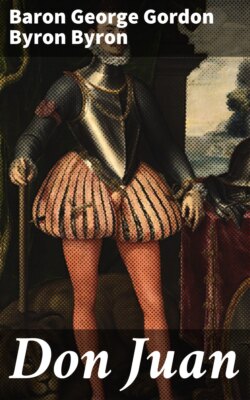Читать книгу Don Juan - Baron George Gordon Byron Byron - Страница 6
На сайте Литреса книга снята с продажи.
ОглавлениеNo more—no more—Oh! never more on me
The freshness of the heart can fall like dew,
Which out of all the lovely things we see
Extracts emotions beautiful and new,
Hived in our bosoms like the bag o' the bee:
Think'st thou the honey with those objects grew?
Alas! 't was not in them, but in thy power
To double even the sweetness of a flower.
No more—no more—Oh! never more, my heart,
Canst thou be my sole world, my universe!
Once all in all, but now a thing apart,
Thou canst not be my blessing or my curse:
The illusion 's gone for ever, and thou art
Insensible, I trust, but none the worse,
And in thy stead I 've got a deal of judgment,
Though heaven knows how it ever found a lodgment.
My days of love are over; me no more
The charms of maid, wife, and still less of widow,
Can make the fool of which they made before—
In short, I must not lead the life I did do;
The credulous hope of mutual minds is o'er,
The copious use of claret is forbid too,
So for a good old-gentlemanly vice,
I think I must take up with avarice.
Ambition was my idol, which was broken
Before the shrines of Sorrow, and of Pleasure;
And the two last have left me many a token
O'er which reflection may be made at leisure:
Now, like Friar Bacon's brazen head, I 've spoken,
'Time is, Time was, Time 's past:'—a chymic treasure
Is glittering youth, which I have spent betimes—
My heart in passion, and my head on rhymes.
What is the end of Fame? 't is but to fill
A certain portion of uncertain paper:
Some liken it to climbing up a hill,
Whose summit, like all hills, is lost in vapour;
For this men write, speak, preach, and heroes kill,
And bards burn what they call their 'midnight taper,'
To have, when the original is dust,
A name, a wretched picture, and worse bust.
What are the hopes of man? Old Egypt's King
Cheops erected the first pyramid
And largest, thinking it was just the thing
To keep his memory whole, and mummy hid;
But somebody or other rummaging,
Burglariously broke his coffin's lid:
Let not a monument give you or me hopes,
Since not a pinch of dust remains of Cheops.
But I being fond of true philosophy,
Say very often to myself, 'Alas!
All things that have been born were born to die,
And flesh (which Death mows down to hay) is grass;
You 've pass'd your youth not so unpleasantly,
And if you had it o'er again—'t would pass—
So thank your stars that matters are no worse,
And read your Bible, sir, and mind your purse.'
But for the present, gentle reader! and
Still gentler purchaser! the bard—that 's I—
Must, with permission, shake you by the hand,
And so 'Your humble servant, and good-b'ye!'
We meet again, if we should understand
Each other; and if not, I shall not try
Your patience further than by this short sample—
'T were well if others follow'd my example.
'Go, little book, from this my solitude!
I cast thee on the waters—go thy ways!
And if, as I believe, thy vein be good,
The world will find thee after many days.'
When Southey's read, and Wordsworth understood,
I can't help putting in my claim to praise—
The four first rhymes are Southey's every line:
For God's sake, reader! take them not for mine.
